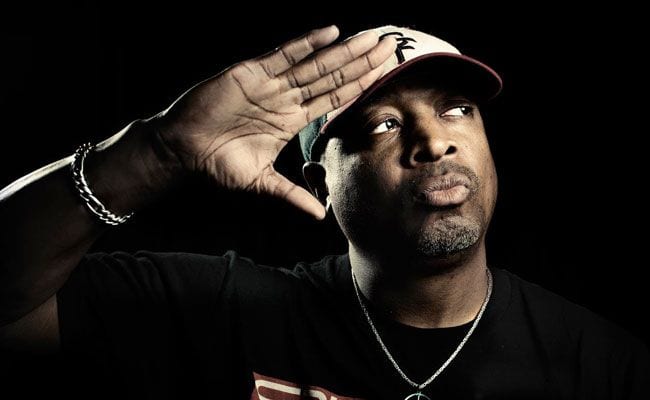Chuck D’s The Black in Man is easily the best major release I’ve heard all year, but that might say more about me than the album. I’m old enough to have been John Hughes’ original target audience, and like a lot of geezers, I’ve been disillusioned by the state of commercial hip-hop over the years. Maybe this is unfair — hip-hop is as musically diverse as any pop movement, maybe even more so. And unlike the rock ‘n’ roll crowd, the audience actually rewards innovation in style with loyalty and sales. But why has the substance been driven so far underground? Why must the Top 40 be so elusive for artists with something to share?
Look, I like Nicki, and I love that she embraces her body and sexuality (along with her general kookiness), but watching journalists fumble over themselves to consider the “Anaconda” video “subversive” – or even “significant” – is laughable. It’s something much simpler and sadder – another exercise in pop superstar solipsism. It’s hard to remember the last time a hip-hop superstar floored you with words and rhymes – and isn’t that what the who genre’s about?
Enter Chuck D, poet, prophet, teacher, and Public Enemy Number One, here to set the world straight and make it bounce while he does it. Too many rappers tell you they can’t be touched. Chuck D shows you. The mighty Chuck drops knowledge in every sense of the word, filling your ears with rage, hope, perspective, and his amazing rhymes. There are boasts, but every one of ’em is backed up with his sharp intelligence, deep delivery, and huge, old-school East Coast beats that could serve as instrumental tracks all on their own. These are “old-school” beats, no doubt, loaded with sound and fury, but they sound fresh to my aging ears, partly because I gravitate toward the artists who earn their cool by not giving a rat’s ass.
“Spread the Words” kicks it off with huge beats and immediate throwdowns: “There’s a difference between censorship and senseless shit.” It’s a battle cry, a response to all those who think Chuck fell out because he’s no fun, and he’s wise to bring in Jasiri X and Jahi to back him up as they attack the “verbal pollution without solutions” that define hip-hop radio.
He follows this with “Give We The Pride,” which features Mavis Staples (Mavis Staples!), and holy hell, what a funky track, loaded with soul licks, tasty sax breakdowns, and Staples’ killer rasp. This time, his badass lecture is loaded with hope and pride: “Y’all know better than that / You know why? / Because y’all better than that”. You’ve got the skills, he’s saying, now use them. Chuck’s skill is his ability to transcend his stance as a moralist father figure (think Saul Williams at his most pedantic) and transform into a true hip-hop preacher.
Did I mention how great this all sounds? It’s loaded with sounds, soul, beats, bass, and heart. Chuck’s sense of music is all over “Get it Right Or Be Gone”, a brilliantly direct challenge to hip-hop radio stations steeped in baseball metaphors. His canny use of hooks and call-outs makes the words ring out with more depth and clarity (“A song is more than a record, check it / A movement is bigger than a song, check it”). The song has already caused some scuttle, but Chuck could be rapping in French, and you’d still put the track on repeat, furiously nodding your head.
Chuck throws style after style at you. All old-school, of course, from the hard-rock bluesy groove of “Ican” to the id-heavy punk banger “Grudge” to the blaxploitation bounce of “PIC I Hate Every Inch of You” to the dripping-with-soul remake/sequel “Say it Loud (I’m Black and I’m Proud)”. He’s not above some old-fashioned boasting, either (“I smoke stages at this stage and age / I get high off what I wrote down on pages”), but he earns every smoke, wowing us with constant wordplay and his trademark intelligence.
Maybe this strikes you as too heavy, too didactic for today’s scene. Without a Flava Flav to lighten things up from time to time, Chuck runs the risk of becoming a tired old moralist. Who wants to be lectured at while getting your groove on? But despite his glowered brows, Chuck isn’t really damning the light side of music as much as he’s lamenting how the hard stuff keeps getting pushed aside in favor of easy money. In one of his intros, he shakes his head over “tastes great, less filling rap” before asking us “How long can you eat Twinkies for dinner?” And don’t worry, this is a short set (37 minutes). It won’t wear you down. Besides, even if the message weighs on you, you cannot deny the skill of the method.
And man, oh man, what a method. I gotta say it again: this is great music, an onslaught as soulful and danceable as the amped-up country that the other musical pioneer named Chuck turned into hellcat rock and roll. Hell, this is rock and roll. Fans will notice Chuck’s voice is deeper than ever — it’s a force of nature. Just be happy he’s on your side because when he speaks, there’s no doubt you will do whatever he tells you. As well you should.


![Call for Papers: All Things Reconsidered [MUSIC] May-August 2024](https://www.popmatters.com/wp-content/uploads/2024/04/all-things-reconsidered-call-music-may-2024-720x380.jpg)



